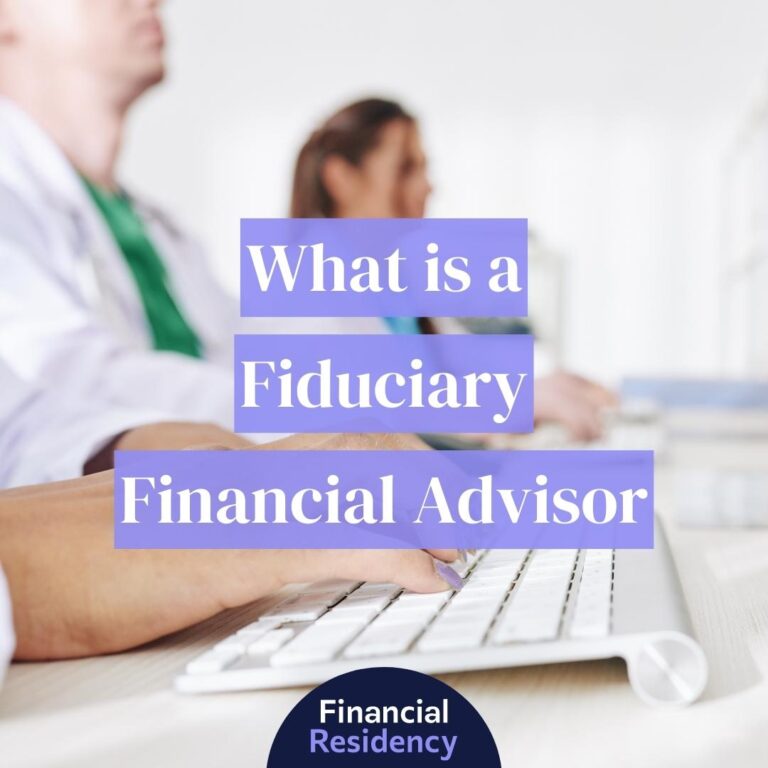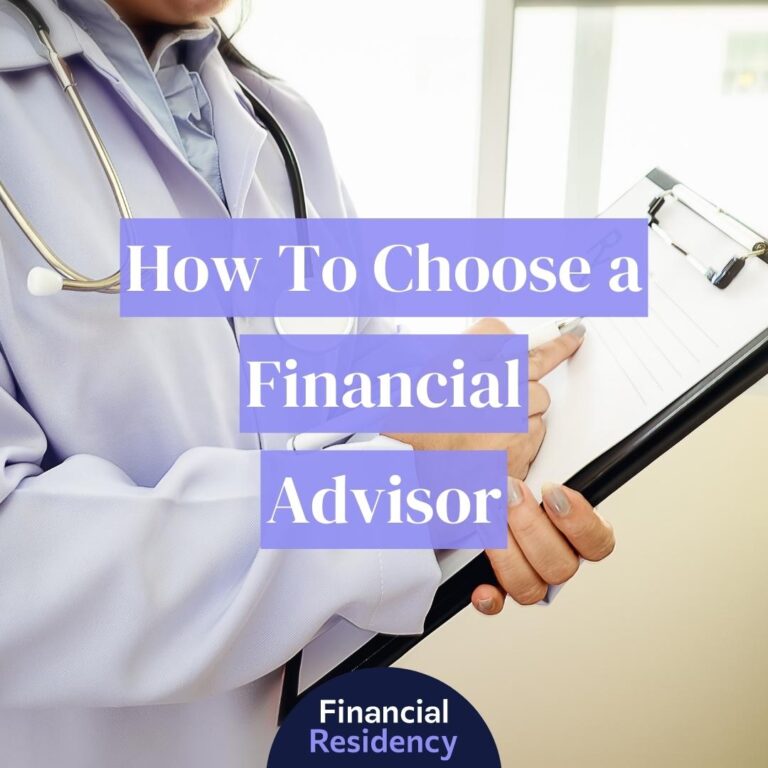If you open Google and search the terms “financial advisor near me” or “financial advisor for doctors,” you’ll get a list of sponsored results. And probably a scrollable list of advisors near you that lists names and addresses of CFPs based on how close they are to your current location.
Sorting through 20 unfamiliar names with nearby offices for a half dozen or so large national firms can be overwhelming. Everyone looks qualified, right? So where do you start?
You could thoroughly do your homework and look up all these local advisor names. But there are easier ways to go about finding the best CFP to meet your financial goals — including the special needs of physicians.
In this article, we’ll cover what is meant by the term certified financial planner, and how to go about looking for the best one to fit your personal finance needs.
What Is a Certified Financial Planner?
A certified financial planner (CFP) is an investment advisor with expertise in helping clients with their financial planning.
This can include:
- retirement
- education savings
- taxes
- generational wealth preservation
- asset management
- investing
A CFP title is prestigious. It requires a Bachelor’s degree, additional education courses, and then passing a series of challenging Certified Financial Planner Board of Standards exams.
To maintain licensure, a CPF must regularly complete continuing education (CE) and practical experience requirements.
How to Find a Certified Financial Planner
While “just googling it” could lead you to the right financial professional, there are more focused ways to go about your search of finding a certified financial planner.
1. Certified Financial Planner Board of Standards Website
Exploring the CFP Board of Standards may be a good place to start. The CFP Board website features a database you can search to find a CFP near you.
You can search for a CFP based on numerous filters, including location, areas of expertise, number of clients, years in operation, services offered, or languages spoken.
2. The Financial Planning Association (FPA)
The FPA is an organization for CFPs and other professionals engaged in wealth management and financial planning. The FPA offers educational resources, including CPF continuing education credits.
Although it’s designed to assist and advocate for financial planners, the FPA does offer pro bono services. Additionally, it can connect you with vetted CFPs and other qualified financial experts in your area.
3. Association of African-American Financial Advisors (AAAA)
The AAAA (Quadruple A) is a nonprofit group dedicated to expanding the community of successful Black Financial Professionals and helping Black investors achieve sustained generational wealth.
The organization can connect you with a Black CFP or other finance advisor in your area. There is a “Find a Financial Advisor” form on the AAAA website.
4. National Association of Personal Financial Advisors (NAPFA)
NAPFA is the nation’s largest organization of fee-only financial planning professionals.
NAPFA advisors are paid for their services as needed. They may charge a flat fee or an hourly rate. Most advisors, by contrast, earn a commission based on the percentage of assets under management (AUM).
This may be a more objective method, as it can minimize any conflicts of interest (i.e., upselling products) and ensure your planner acts as a true fiduciary.
NAPFA has a particularly robust and helpful online directory to find member CFPs and other planners.
5. XY Planning Network
The XY Planning Network offers fee-for-service financial advisory. Rather than charging a commission for AUM, they charge an hourly rate or flat-fee monthly rate.
There are over 1,600 participating CFPs and financial advisors in the XY Planning Network. You can find a planner based on laser-specific interests and specialties. This includes dozens of professionals with expertise in financial services for medical doctors and dentists.
You can use their directory to find an advisor anywhere in the U.S. All XY Planning Network advisors offer virtual financial planning services.
6. The Garrett Planning Network
Founded in 2000, the Garrett Planning Network is a national organization of hourly fee-only financial planners. The growing network has hundreds of CFPs, certified public accountants (CPAs), and personal financial specialists (PFSs).
Some Garrett planners will offer online consulting services, or you can find a local consultant in your area. A good start may be searching for a planner by areas of specialization in the search directory.
7. Referrals from Friends or Family
Ask your friends, colleagues, and family members for referrals. They may have a long-term relationship with a financial advisor whom they trust. If your cousin has worked with the same advisor for decades and has seen outstanding results, it may be worth reaching out.
Make sure, however, to not blindly accept referrals either. Your coworker may know a planner who is truly excellent, but they may charge higher fees, specialize in areas that are not relevant to you, or lack certain financial planning certifications.
A referral from someone you trust is worth your time to look into, but ultimately you should still do your homework.
8. Robo-Advisors
Robo-advisors are a low-cost alternative to traditional CFPs and other financial planners. They are low-fee, online investment platforms that rely on algorithms to create and optimize investor portfolios.
These robo-advisor platforms have very low or no minimum balance requirements and charge much lower annual fees than traditional investment management companies. Typically their fees are around 0.25% to 0.50%.
While it’s primarily a hands-off, automated approach, some platforms do have added services and features, including the ability to connect with a human CFP.
Some reputable robo-advisor platforms to consider include Betterment, Wealthfront, and Schwab Intelligent Portfolios.
9. Reputable Firms
Working with a reputable investment management firm like JP Morgan Personal Advisors is another way to find a qualified CFP.
Financial Advisors at these firms invest your money in a mix of funds and assets based on your short and long-term financial goals. Typically their company earns a 1 to 2 percent commission for all of your assets under management.
Using a planner at large investment companies may be a more expensive approach, however, you’ll get a broader range of investment options and additional client support that only a large financial outfit can provide.
INVESTMENT AND INSURANCE PRODUCTS ARE: NOT A DEPOSIT • NOT FDIC INSURED • NO BANK GUARANTEE • MAY LOSE VALUEFactors to Consider When Choosing a Certified Financial Planner
When reviewing your options for selecting a CFP, here are some factors to evaluate.
- What services will you need? Do you need assistance with taxes, estate planning, establishing trusts, or debt management? Or are you looking simply for long-term portfolio management for retirement?
- What type of planner or advisor do you need? Do you need to work with a certified financial planner (CFP), or would a financial advisor (FA)? FAs perform the same work as CFPs but lack certain additional certifications.
- Do you want to work with a large firm? Or would you prefer to work with a CFP at a smaller outfit? The latter may focus on servicing a particular client group, like physicians, first-generation immigrants, current retirees, or small business owners.
- Do you want to meet in person at your advisor’s office? Or would you prefer to connect virtually? Since Covid, most all advisors accommodate some virtual meetings but consider how you want to primarily meet with your planner.
- Does the advisor have the certifications they’re claiming? Make sure they have the needed qualifications to operate as a CFP, FA, or other finance professional. CFPs and FAs who want to sell financial products must pass a licensing exam from the Financial Industry Regulatory Authority (FIRA) and register with the U.S. Securities and Exchange Commission (SEC). You can verify their status on the NAPFA
- What payment structure do you want? Large investment firms often have a sliding scale fee, where the more assets you have the lower your AUM Some feel this commission-type payment structure can be a conflict of fiduciary duty, and prefer instead to work with fee-only advisors that charge a flat-rate, hourly, or per-project fee.
Questions to Ask a CFP
After you’ve determined what you’re looking for in a financial advisor in terms of certifications, company resources, and fee structure, you can meet with potential CFPs and ask them questions about their services and approach.
- Are you a fiduciary?
- How long have you worked in the industry?
- What type of investors do you primarily work with?
- What services do you offer
- How and when will you communicate with me?
- How can I contact you?
- How are you compensated?
- How much will I pay for your services?
- Based on my personal goals and finances, would I be a good fit?
- How do you balance meeting company sales goals and representing a client’s best interests?
- What is your philosophy on balancing short-term versus long-term savings goals?
FAQs
Are There Special Considerations for Physicians Looking for a Certified Financial Planner?
Yes, ideally you would look for an advisor who has experience working with physicians. They will have familiarity with physician-specific financial needs, like 457(b) and 403(b) plans, backdoor Roth IRAs, large spikes in income, medical loan debt, disability insurance,
Can I Have More Than One Financial Advisor?
Yes, you can. Working with one or more advisors may be a smart move depending on your different goals and budget.
It’s a good idea to only start with one. Then if you need more help with certain areas of your portfolio or finances, you can hire other advisors for the incremental expertise they bring.
Is a CFP Always a Fiduciary?
No, not always. In addition to a Bachelor’s degree, a CFP must undergo extensive training, and coursework and pass a CFP licensing exam — a process that can take 12 to 18 months. However, a CFP is not always held to a fiduciary standard.
Advisors That Are Fiduciaries
An advisor who is fee-based and federally registered as an investment advisor is a fiduciary.
CFPs register federally through the U.S. Securities and Exchange Commission (SEC). You can verify a CFP’s registration on the SEC website.
Advisors That Are Not Fiduciaries
Advisors that hold a Series 7, Series, 65, or Series 66 license may not be required to act as a fiduciary.
These advisors must pass the General Securities Representative Qualification Examination (GS), which is administered by the Financial Industry Regulatory Authority (FINRA).
- Advisors holding a Series 7 license alone are likely not fiduciaries
- Advisors holding a Series 65 or 66 license from FINRA may be held to a fiduciary standard in some scenarios
- Advisors holding a Series 7 and Series 66 license are likely fiduciaries. A CFP must hold both of these licenses before they can register with their state.
Regardless of any advisor’s claims, the onus is on you as the consumer to verify their claims. In addition to the SEC website, you can use FINRA’s BrokerCheck to research the professional and investment background of any advisor, brokerage firm, or investment company.
Also, a non-fiduciary advisor is not necessarily bad. If this standard is not required by their state, it could be that an advisor chose to not employ resources to pursue an unneeded fiduciary certificate.
How Do You Know if a Financial Advisor is Trustworthy?
There are a number of ways to gauge a financial advisor’s trustworthiness.
- Use FINRA’s BrokerCheck or call FINRA directly at 1-800-289-9999
- Visit the SEC’s Investment Adviser Public Disclosure (IAPD) website
- Contact your state’s securities regulator office
Of course, you’ll need to do your own research and trust your gut instincts. If you get an uncomfortable vibe with a planner — even a highly recommended one — you don’t need to work with them. This doesn’t mean they aren’t legit; rather you have lots of options and you need to select the best fit.
A CFP helps you with retirement planning and other investment goals; you need to feel comfortable with them providing intimate financial advice.
Bottom Line
In the age of Google, it’s easy to find endless lists of certified financial planners who provide advisory services online or in person.
But we’ve shared with you some helpful ways you can find a trusted planner with CFP certification whose interests, outreach, and expertise meet your needs.
Not every financial advisor will have a CFP designation or even be a sworn fiduciary, so make sure to ask questions and do your homework.



